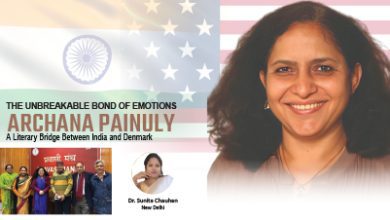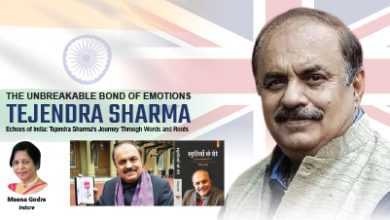THE UNBREAKABLE BOND OF EMOTIONS; RAMA SHARMA

Segment dedicated to decorated personalities of Indian origin and/or heritage who eventually moved to the foreign land to achieve their professional aspirations. Doing so, they became ‘foreigners’, for namesake to their motherland. In this segment, we wish to explore their journey from Desh to Videsh and try to peek into their hearts as to where it beats.
In this edition we bring excerpts of our exclusive interview with Hindi laureate Ms. Rama Sharma – a highly successful Hindi Educationist/Writer and Contributor to the Indian heritage based out of Japan.
Introduction : Hindi Literature Laureate and Poetess Rama Sharma
Rama Sharma is a seasoned Hindi Laureate decorated with several awards for her contribution and promotion of Hindi Literature in Japan. She has been living in Japan for the last 33 years and is credited with bringing out the first and very popular Hindi magazine – “Hindi ki Goonj” this is first hindi magazine from Japan, with Japanees ISSN number.
She currently lives in Tsukuba (science city) , a town near Tokyo and enjoys teaching Hindi to kids.
Settling abroad isn’t easy. Your family too had moved early in Japan. Do you believe that things are comparatively easier for people (rather Indians) to settle in Japan, given so much has changed over years and any advice for people exploring Japan for professional reasons?
I came here 33 years ago and earlier things were pretty different. I had my own struggles before finding my feet here. However, today I admire the young Indian generation particularly who come here to make a career for themselves. I see how well informed and enterprising they are in the internet age where access to information is relatively easier.
Japan is a culturally rich country that values its own customs and traditions. Though people do speak English, Japanese is still their preferred language of communication. Hence, my advice would be to acquaint yourself with Japanese language and culture if you wish to explore Japan for career opportunities.
You have seen Japan grow from close quarters, likewise India is also currently at this phase of growth. Do you see any similarities? How do you feel that India is again on its path to become a global leader achieving its glory across sectors and among countries in the world?
Yes, I have seen Japan grow tremendously in the last 4 decades, starting from infrastructure and touching upon all other areas of the Human Growth Index including public safety and quality of life.
Having said so, I feel proud to see how India under the current leadership of our Hon’ble PM is scaling heights. I find we are both culturally aligned and see similarities in the pattern of infrastructure growth.
However, I would like to highlight that generally when talking about growth we only focus on economic parameters and more often forget about parameters like quality of life, public health and safety, crime and corruption. I think on these social and human aspects India needs to do a lot to be compared to Japan and the onus is on us to change for better.
If I can put it out precisely, I feel we Indians need to embrace discipline across levels in our day to day lives, practice zero tolerance for corruption, and Education being an important growth factor, start using the government schools and colleges to help them run and be managed better. This will certainly improve the social aspects, quality of life and above all safety and security of residents at large.
You have dedicated your life to promoting Hindi Language in Japan. Walk us through your experience.
Exchange between Japan and India is said to have begun in the 6th century when Buddhism was introduced to Japan. Indian culture, filtered through Buddhism, has had a great impact on Japanese culture. Ever since the establishment of diplomatic relations, the two countries have enjoyed cordial relations paving the way for mutual admiration for each other’s culture.
Language has always been an important aspect of human civilization and binds the community together and therefore, plays a very important role in the growth of the people and its country. Japanese love and respect their culture, heritage, country, and language deeply and it is part of their life wherever they go or are settled.
Likewise, Indians outside of India are more attached to their roots and often ensure to keep that attachment going. Drawing inspiration from the above and given my love for Hindi, I started my journey to help people learn this beautiful and one of the oldest languages in the world.
Having spent considerable part of my life in Japan, unlike India (where adoption of English culture, language and customs are gaining momentum) I have seen a growing affinity towards Hindi among Japanese and other foreign nationals here. What started as a hobby to keep my kids attached to Hindi and our Indian roots has now blossomed into a Language Centre for Hindi catering to several students. Being the passionate person I am, till date I don’t recollect how working alone without any financial aid or collaborating with NGOs, this became possible.
Many Indians have migrated to Japan over the years to explore better career opportunities and are very successful as professionals, businessmen, and otherwise. The overseas Indian community has a considerable presence, influence and is very well connected among themselves but do you think they equally feel connected to India? If so, how and why?
I feel that our Indian values, culture and heritage, unites and brings us closer (wherever we are) to our country. There is no disconnect, on the contrary, I feel the bond with our motherland is stronger here. This is reflected in the manner, we all get together to celebrate India, Indian festivals, stand united on issues pertaining to our country’s interests and do our bit in aiding the cause of uplifting of the under-privileged in India or during natural calamities. I am hopeful that our future generations will keep India and its culture alive wherever they will be.
What are your thoughts about some of the Indian Government’s initiatives like the OCI programme?
I feel that the current OCI programme is a very good step and has been well received and appreciated by the Pravasi Bhartiyas in Japan to the best of my knowledge. It has actually made travelling to India hassle free and very convenient.
How have you kept India alive in your family?
India is very much part of our family and whatever we do, there is a reflection of our Indian culture in whatever we do – be it dressing, eating , or even gifting. There is an unwritten rule of our house (till date ever since we moved to Japan) that Hindi will continue to be our only language for communication among family members. We follow all customs, rituals and traditions; celebrate all Indian festivals (including Rakhi, Navraatri, Vijayadashmi, Deewali, Holi etc).

Principal
Pro-consulting.solutions






